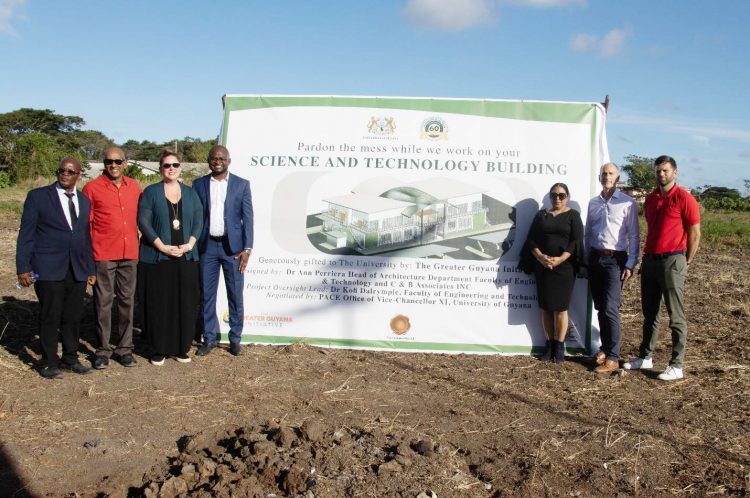The University of Guyana is collaborating with one of its key development partners to construct a state-of-the-art Science and Technology building at its Turkeyen campus and is proposing to name a wing after fallen GDF officer, Brigadier Gary Beaton, who was a Graduate Engineer of UG’s Faculty of Engineering and Technology.
In a release yesterday, the university announced that on Friday, along with one of its partners, the Greater Guyana Initiative (GGI), the sod was turned for a three-part project which includes the construction of a new and modern state-of-the-art Science and Technology Building at the Turkeyen campus. It further disclosed that the other two parts of the project will include retrofitting of labs in the Faculty over the next few months and the addition of three new labs into the existing Faculty of Engineering building.

According to the release, the project seeks to achieve five main goals. 1) Creating 50 per cent of the lab-teaching spaces currently needed for new and upgraded programmes; 2) extending the disciplines offered in STEM by the faculties of Engineering and Technology and the Faculty of Earth and Environmental Sciences; 3) doubling the number of graduates in Engineering in three years in keeping with the high demand for UG-trained engineers by the public sector, Government of Guyana, oil and gas, as well as the private sector; 4) providing purpose-built facilities for staff and students, and promoting collaborative cutting-edge research and problem focused interdisciplinary teaching; and 5) supporting the first International Accreditation of the Faculty of Engineering and Technology which is due in 2024.
This project, it was explained, is part of a larger US$2.1 million 5-year collaboration between UG and GGI, which was negotiated in 2019 by the university’s Office of Philanthropy, Alumni, and Civic Engagement (PACE). GGI comprises the Stabroek Block co-venturers – ExxonMobil Guyana Limited, CNOOC Petroleum and Hess Corporation [which is selling its interest to Chevron Corporation]. Their gift to the University is expected to benefit thousands of students who wish to develop careers in science, technology and engineering.
Further, the project will also support the developmental push in Guyana by doubling the number of engineering and tech graduates in the next three years as well as assist the Faculty for Accreditation Board for Engineering and Technology (ABET) to prepare for accreditation next year. It also represents an interdisciplinary collaboration between the Faculty of Engineering and Technology (FET) and the Faculty of Earth and Environmental Sciences (FEES).
The project represents an interdisciplinary collaboration between the Faculty of Engineering and Technology (FET) and the Faculty of Earth and Environmental Sciences (FEES). The 15,000 square feet space has been designed as shared spaces to facilitate areas of work where synergy exists for these faculties, including water and energy sustainability through use of solar energy and information technology. It will include labs, new classrooms and offices.
The 15,000 square feet space has been designed as shared spaces to facilitate areas of work where synergy exists for these faculties, including water and energy sustainability through use of solar energy and information technology. It will include labs, new classrooms and offices.
Vice-Chancellor, Professor Paloma Mohamed-Martin, in her remarks at the ceremony underscored the importance of the facility noting that it will boost UG’s capacity to produce the quality and quantity of engineers that are needed which she observed has “increased tremendously” over the past few years.
She explained that over the past six to seven years, the university has seen a “massive increase” in the number of applicants to the engineering and other technical programmes being offered and to keep up with this demand, such a facility is very much needed. She also took the opportunity to thank GGI for its support.
“This is a very significant moment; I would like to thank GGI. I would like to thank our GGI family because they have really stood with the university.” She also disclosed that several new path-breaking projects aimed at further developing the university and its students and staff have been in the implementation phase over the last 14 months and are now ready to be launched very early in 2024.
Meanwhile, ExxonMobil Guyana Limited Country Manager, Alistair Routledge, who spoke on behalf of GGI remarked: “I am delighted to be here for the sod-turning event at this pivotal moment. I stand here on behalf of ExxonMobil Guyana, CNOOC and Hess as the Stabroek Block co-venturers. What brought us here to Guyana was to explore for and develop the natural resources in the form of oil and gas in the country. Thankfully for all of us, we have been successful in that journey and because of that we are in this great position where we have also been able to set aside funds to support these kinds of projects.”
And Project Oversight Lead and Head of Department of Civil Engineering at UG, Dr Kofi Dalrymple, in presenting an overview of the project, informed that the project is part of a larger plan to equip FET, along with its interdisciplinary partners, specifically FEES, to serve the needs of Guyana.
Dr Dalrymple explained that the project provides for the retrofitting of the existing FET facilities to address issues and adapt to new learning approaches. “Our labs are in dire need of upgrade. To train the engineers of the future, we need facilities that foster learning, cutting-edge research centres, and well-equipped classrooms that create an environment to stimulate curiosity and foster hands-on learning experiences.”
He added that the project will seek to modernise the facilities to serve as incubators for innovation, allowing aspiring engineers to engage in ground breaking research and development projects.
The Head of Department also pointed out that the project will allow for the expansion of the existing FET laboratory, while disclosing that although the student enrolment rate has almost tripled, the facilities remain the same. “The Faculty has estimated the need for an additional 23,000 square feet in new lab space. This project will add a much needed 5000 square feet. We also are adding new expanded labs for Petroleum and Geology – areas of priority for our faculty and our country.”
Meanwhile, President of the Society of Petroleum Engineers, Student Chapter, Kezia Chinian, and Reyhanah Abdul-Kadir, a former engineering student, both pointed to the many positive impacts the new building will have on students as they seek to develop their careers in science, technology and engineering.
The release said that the design team comprises architects and engineers from the faculty, including Dr Anna Perreira, Dr William Wilson, a structural engineer; and Colin Quintyn. The UG team has also been supported by the design team of CB and Associates.
The university explained that its collaboration with the GGI spans several critical areas of capacity building and development for the University including the Zoom Rooms project which laid the first building blocks for UG’s blended learning architecture, the Campus Safety and Security project which seeks to enhance safety for staff, students and visitors to the campus, and the Regional Accelerator for Stem Students Readiness (RASSR) programme which is a mentorship and development initiative targeting young STEM students across Guyana.
The university has proposed the naming of a wing of the building after Brigadier Gary Beaton of the GDF, who along with four other servicemen. tragically lost their lives last week. Beaton was a graduate engineer of the University of Guyana’s Faculty of Engineering and Technology. In addition, UG will also introduce the Five Heroes Award in the names of all of the five fallen servicemen, a university-wide award for students who are officers, servicemen or reserves who attain a high academic profile from 2024, the release added.






